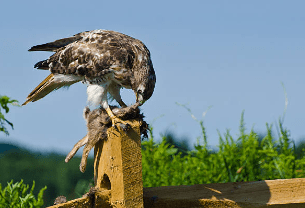Ever wondered who stands atop rabbits in the food chain?
As a seasoned wildlife biologist, I share your intrigue! This web of survival can be perplexing, especially when we examine the question, “What eats rabbits?”
Delve in with me as we unravel this mystery.
Rabbits, with their hopping agility and sheer numbers, are a staple in many a predator’s diet.
The variety of predators is vast, ranging from terrestrial aerial to aquatic.
In this guide, We’ll span different habitats, moving from the dense forests to the expansive skies and aquatic realms.
Hold tight as we weave through this intricate tale of survival, predation, and adaptation!
Let’s dive in.
Table of Contents
Role of Rabbits in the Ecosystem
As herbivores, rabbits perform a crucial function in the ecosystem. Let’s delve into these vital roles:
- Food Source: Rabbits serve as an essential food source for many predators. By virtue of their abundance, they fuel a large part of the food chain.
- Plant Regulators: They help control plant population, preventing an overgrowth of vegetation.
- Soil Enrichment: Their droppings enrich the soil, enhancing its fertility and aiding plant growth.
Rabbits, thus, create a link between the plant and animal kingdom. They maintain a balance, ensuring the survival of various species, including their predators.
Land Predators: Hunting on the Ground
Ground predators make up a significant portion of the predators that feast on rabbits. Here’s a glimpse into the hunting tactics and preferences of some of these intriguing creatures.
Foxes
Let’s begin with foxes, crafty and agile predators who possess a particular fondness for rabbits. They rely on their sharp senses and a stealthy approach to stalk and ambush their prey.
Whether it’s the quicksilver red fox or the nocturnal gray fox, rabbits are often on their menu, contributing significantly to their diet.
Coyotes
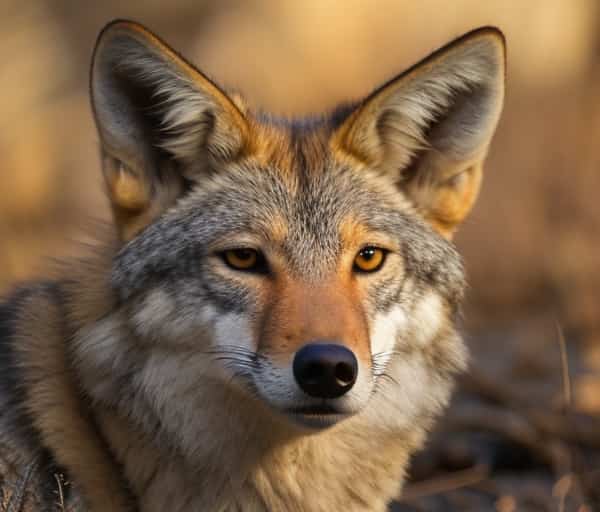
Next in line are coyotes, opportunistic predators that aren’t too picky when it comes to food. Their diet is diverse, but rabbits often form a significant portion.
Coyotes use their excellent hearing and keen eyesight to locate rabbits and their lightning speed to chase and capture them.
Wolves
Wolves, much larger than the previous two, also hunt rabbits, especially when larger prey is scarce. A rabbit might seem like a small meal for such a large predator, but in the wild, every opportunity counts, and wolves are not the ones to waste a chance at a meal.
Bobcats
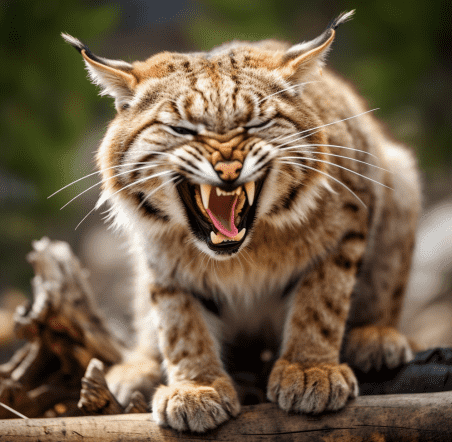
Stepping into the cat family, bobcats are known for their rabbit-hunting prowess. Bobcats use a sit-and-wait approach, ambushing rabbits that unknowingly hop into their range. They have a quick strike and are swift runners, which makes escaping difficult for the rabbits.
Lynxes
Lynxes, much like their bobcat cousins, are skilled hunters. Their rabbit-hunting skills, however, are aided significantly by their large, tufted ears that allow them to pick up even the faintest sounds of movement, alerting them to a potential meal.
Raccoons
Raccoons might seem out of place on this list, but they are known to prey on rabbits, particularly young ones. Nocturnal hunters rely on their dexterous paws and sharp claws to capture and handle their prey.
Ocelots
Ocelots, native to South and Central America, are smaller cats that are well-adapted to hunting in both trees and on the ground. They are solitary hunters, relying on their excellent night vision and stealth to prey on rabbits.
Domestic Dogs and Cats
Finally, we have domestic dogs and cats. Yes, the pet that snuggles up to you on the couch can be a predator of rabbits. It’s a stark reminder of their wild instincts, which can kick in when a small, fast-moving creature like a rabbit crosses their path.
Aerial Predators
When you ponder what animal eats rabbits, remember to look up! Aerial predators are just as eager for a rabbit meal:
Hawks
Among the aerial predators, hawks are formidable hunters. They can spot a rabbit from high in the sky with their keen eyesight. The red-tailed hawk, in particular, is known to snatch rabbits from the ground with astonishing speed and precision.
Eagles
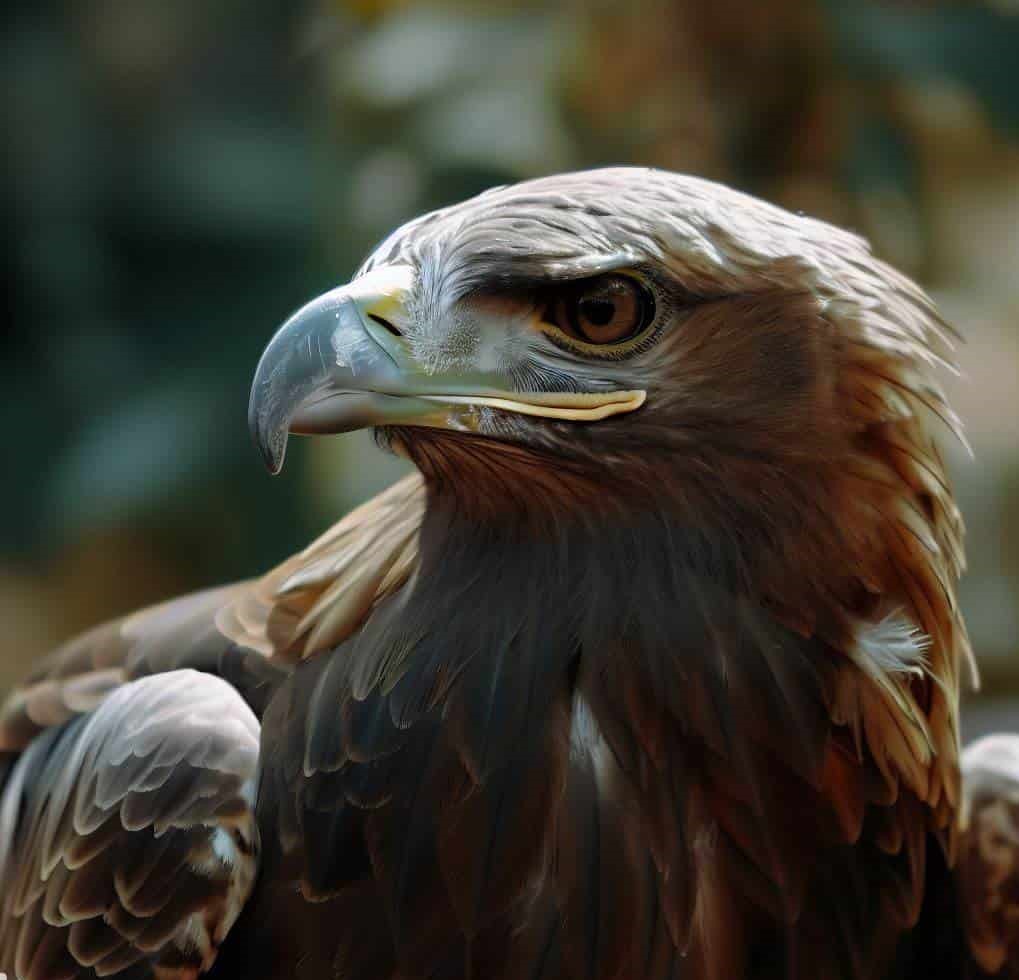
Eagles, majestic and powerful, are next. While rabbits aren’t their primary prey due to their size, smaller rabbits are susceptible to their deadly talons. Golden and bald eagles have been known to include rabbits in their diets.
Falcons
Falcons, often called the bird world’s jet fighters, can dive at incredible speeds to capture their prey. The peregrine falcon, for example, is often triumphant in hunting rabbits due to their swift and deadly aerial maneuvers.
Owls
Lastly, owls, masters of silent flight and nocturnal hunting, pose a significant threat to rabbits. Their superior night vision and stealthy approach make them a deadly predator for unsuspecting rabbits.
Aquatic Predators
Yes, aquatic creatures also contribute to the list of what eats rabbits. Let’s dive into these underwater hunters:
Alligators
Alligators are opportunistic predators who wouldn’t hesitate to snap up a rabbit venturing too close to the water’s edge. Their stealthy hunting approach, waiting patiently under the water to ambush prey, poses a real threat to unsuspecting rabbits.
Snakes
Water-dwelling snakes also pose a threat to rabbits. Large constrictor snakes, like the anaconda, can easily capture and consume rabbits. Even semi-aquatic snakes, such as certain species of pit vipers, have been known to prey on rabbits.
Lizards
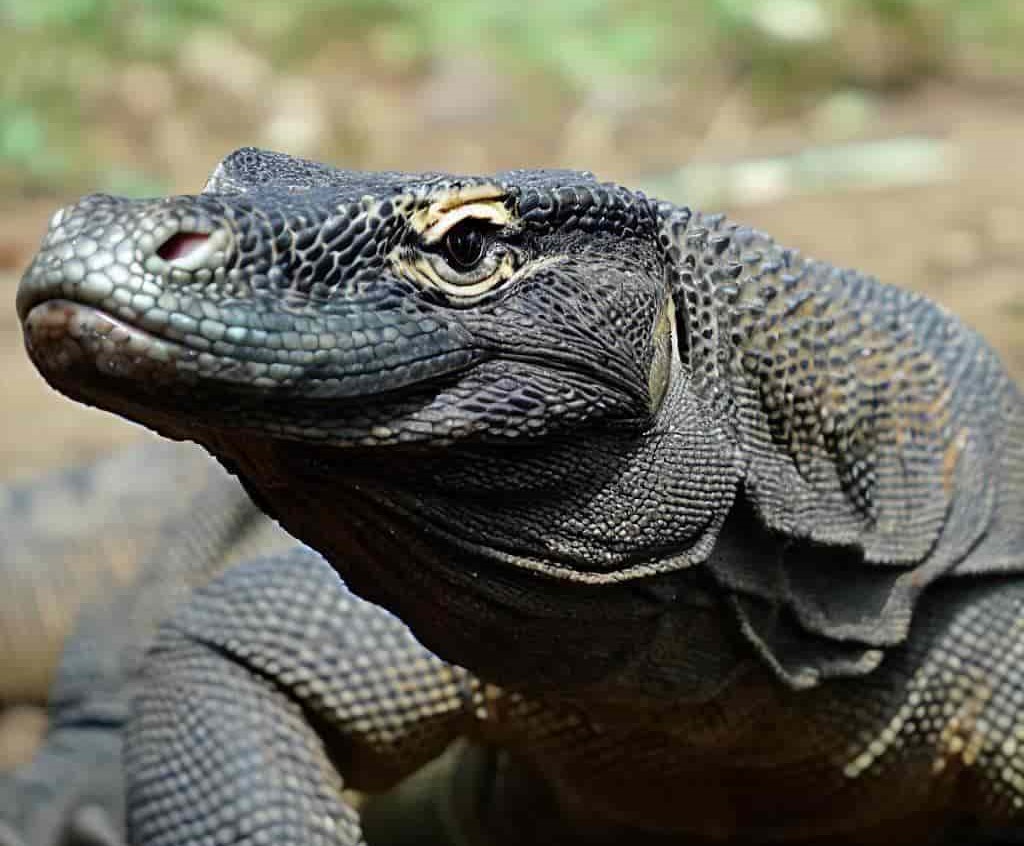
Among lizards, the monitor lizards, particularly the Komodo dragon, might include rabbits in their diet if the opportunity presents itself. Their keen senses, speed, and powerful bite make them formidable predators.
What Eats Domestic and Pet Rabbits?
Domestic and pet rabbits might be safe and sound within our homes, but they’re not completely free from predation risk. Let’s delve into the various predators that may threaten your pet’s safety.
Domestic Dogs and Cats
Contrary to what we might think, our very own pets can pose a threat to rabbits. A domestic dog might see a rabbit as something to chase, while a cat, true to its nature, could perceive a rabbit as potential prey.
Birds of Prey
Birds of prey, such as hawks and eagles, are open to venturing into yards in search of a meal. Their razor-sharp eyesight and swift descent make them dangerous adversaries for domestic rabbits.
Foxes
Despite the natural wariness of humans, Foxes can be lured into backyards by the enticing scent of a rabbit. They are sly and agile, capable of snatching away a pet rabbit in the blink of an eye.
Coyotes
Urban-adapted coyotes are also a real concern for pet rabbit owners. These adaptable creatures can sneak into yards, their keen senses alert to the presence of potential prey.
Raccoons
With their nimble paws and climbing skills, Raccoons can outsmart many enclosure defenses. Their inquisitiveness and opportunistic nature make them capable rabbit hunters.
Snakes
Depending on their size, Snakes can present a significant risk to pet rabbits. Larger species, capable of overpowering a rabbit, are the most dangerous.
Ferrets
Even ferrets, often pets themselves, can pose a danger to rabbits. Despite their playful nature, their innate predatory instincts make them capable hunters.
Predator-Prey Adaptations: Strategies for Survival
Survival in the wild is a constant challenge, and rabbits have evolved strategies to outwit their predators:
Camouflage
Rabbits’ brown and gray coats blend seamlessly with their surroundings, providing a vital first line of defense.
Escape Mechanism
With strong hind legs and a compact body, rabbits can outrun many predators, zig-zagging at high speed to escape.
How to Protect Pet Rabbits from Predators?
Safeguarding our pet rabbits from predators is crucial. Here are some effective strategies to ensure their safety:
Secure Enclosure
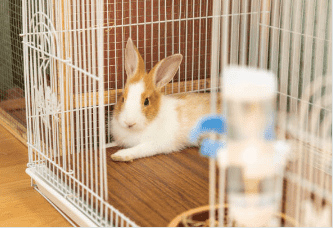
Start with a robust and secure enclosure. This is your first line of defense, designed to resist the efforts of potential predators. Opt for a sturdy material that can’t be chewed through or pushed aside.
Wire Mesh
A wire mesh over any open area can prevent access from aerial predators and climbing animals. The mesh should be fine enough to prevent even small predators from squeezing through.
Elevated Housing
Elevate your rabbit’s hutch. This can help deter ground predators. An elevated position gives your rabbits a better view of their surroundings and a sense of safety.
Predator Deterrents
Consider using predator deterrents. Motion-activated lights or sprinklers can startle potential predators, making your backyard a less appealing hunting ground.
Secure Feeding Practices
Maintain secure feeding practices. Leaving food outside may attract predators, so always ensure feeding happens within the enclosure. Cleaning the area regularly will also help avoid attracting unwanted visitors.
Conclusion
Understanding what eats rabbits helps us appreciate the circle of life. Predators play a vital role in regulating rabbit populations, whether it’s the quick fox or the swooping hawk.
For our pet rabbits, mindful measures can ensure their safety. As we delve deeper into these fascinating interactions, we gain insights into the intricate balance of nature, a spectacle of survival, adaptation, and coexistence.
FAQs
What are the main predators of wild rabbits?
Wild rabbits face numerous predators, including foxes, coyotes, wolves, hawks, eagles, and snakes.
Can domestic pets pose a threat to pet rabbits?
Yes, domestic pets like dogs, cats, and even ferrets can threaten pet rabbits due to their inherent hunting instincts.
How can I protect my pet rabbit from predators?
Protect your pet rabbit from predators by providing a secure enclosure, using wire mesh for security, elevating the housing, adopting secure feeding practices, and using predator deterrents when necessary.
Alina Hartley is a small-town girl with a ginormous love of bearded dragons. It all started with Winchester, a baby bearded who was abandoned at the shelter by his former owners because of a birth defect that caused one front leg to be shorter than the other. Alina originally went to the shelter looking for a guinea pig, but one look at Winchester and it was love at first sight. From that day on, Alina has dedicated her life to learning everything she can about bearded dragons. She loves helping new beardie parents start their incredible journey with these magnificent reptiles.
Follow her on:
LINKEDIN
TWITTER.
Read her latest articles HERE
Learn more about her HERE.

